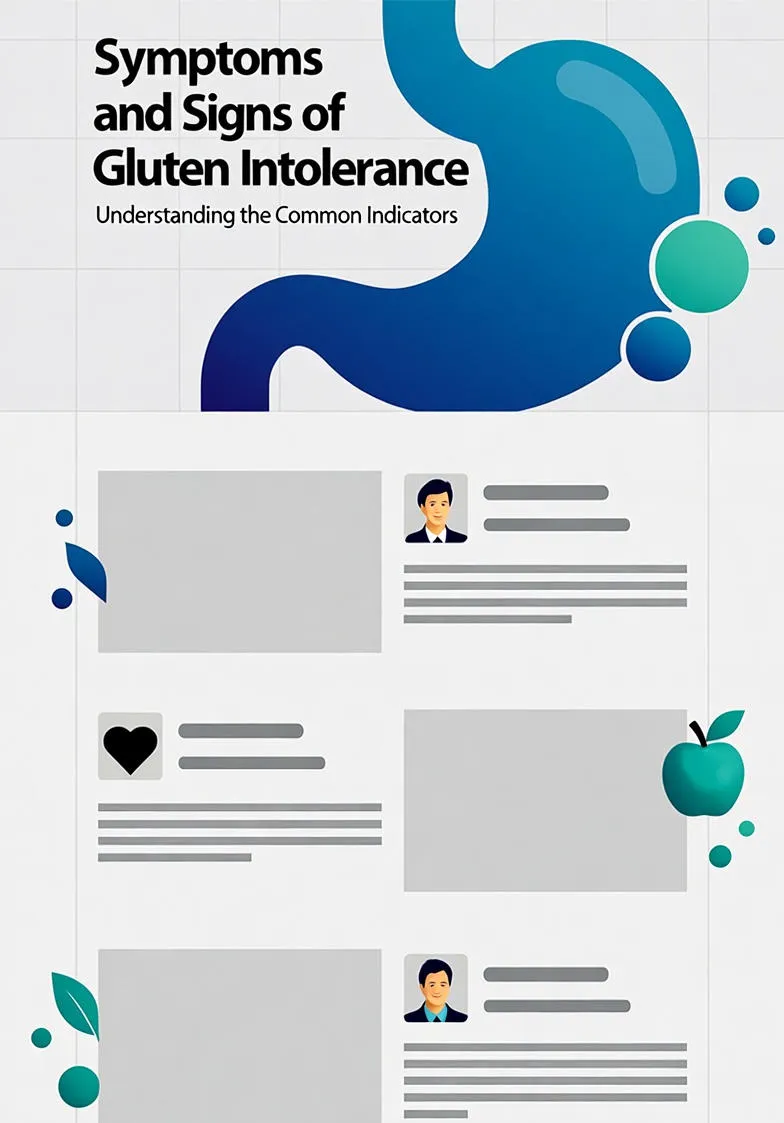Unveiling the Brain-Gluten Connection: How Gluten Impacts Cognitive Health
Explore the science of gluten's effects on the brain, from inflammation and brain fog to neurological disorders like ataxia. Learn symptoms, studies, and tips for better cognitive health.

Introduction
Gluten, a protein found in wheat, barley, and rye, has become a buzzword in health discussions. It's the sticky substance that gives bread its chewiness and pasta its structure. For most people, gluten is harmless and even beneficial as part of nutrient-rich whole grains. However, for a subset of the population, this everyday protein can wreak havoc not just on the gut but on the brain. Emerging research suggests that gluten may influence cognitive function, mood, and neurological health through mechanisms like inflammation and immune responses. In this article, we delve into the science behind gluten's effects on the brain, exploring symptoms, studies, and practical advice.
What Is Gluten and Who Is Affected?
Gluten is composed of gliadin and glutenin proteins, forming a network that traps air during baking. While it's a staple in modern diets, issues arise in conditions like celiac disease, an autoimmune disorder affecting about 1% of the global population, where gluten triggers intestinal damage. Non-celiac gluten sensitivity (NCGS) affects up to 6% of people, presenting similar symptoms without the autoimmune gut destruction. Wheat allergy, though distinct, can also mimic some effects. These conditions don't just cause digestive woes; they can extend to the central nervous system, leading to a cascade of brain-related issues.
Neurological Symptoms Linked to Gluten
The brain-gut axis, a bidirectional communication highway between the digestive system and the central nervous system, explains why gluten might affect cognition. For those sensitive to gluten, consumption can lead to a range of neurological symptoms. Let's break them down:
- Brain Fog: Described as mental cloudiness, difficulty concentrating, and reduced mental sharpness, brain fog is one of the most reported cognitive complaints. In celiac patients, it often precedes diagnosis and recurs after accidental exposure. Even in NCGS, individuals describe feeling 'clumsy' or less effective at work.
- Depression and Anxiety: Rates of these mood disorders are significantly higher in celiac disease—up to four times the general population. A meta-analysis of studies confirms this link, possibly due to nutrient malabsorption or direct inflammatory effects on the brain.
- Headaches and Migraines: Frequent headaches affect 42% of celiac patients, per one study. Migraines, in particular, are common, with pain intensity often tied to gluten intake.
- Attention Deficit Hyperactivity Disorder (ADHD): Both children and adults with gluten-related disorders report ADHD-like symptoms, including hyperactivity and inattention. Parental accounts note improvements in school performance on a gluten-free diet.
- Peripheral Neuropathy: Tingling, numbness, or 'pins and needles' in extremities result from nerve damage. Systematic reviews show high prevalence in celiac disease, with symptoms alleviating on gluten avoidance.
- Vertigo and Balance Issues: Dizziness and spinning sensations, sometimes linked to Meniere's disease, plague many with celiac. Two studies highlight this connection.
- Epilepsy: Rare but documented, gluten sensitivity correlates with seizure disorders, including those with brain calcifications.
- Serious Conditions like Schizophrenia, Bipolar Disorder, and Gluten Ataxia: Elevated gluten antibodies appear during manic episodes in bipolar. Schizophrenia may benefit from gluten-free diets in some cases. Gluten ataxia, an autoimmune attack on the cerebellum, causes coordination loss and is potentially progressive without intervention.
These symptoms underscore that gluten's reach extends far beyond the belly, potentially disrupting daily life and long-term brain health.
Scientific Evidence: Studies on Gluten and the Brain
While anecdotal reports abound, rigorous science is catching up. A landmark 2023 study from the University of Otago in New Zealand provided the first direct evidence of gluten's inflammatory impact on the brain. Researchers fed mice diets supplemented with gluten equivalent to human consumption. Remarkably, gluten increased markers of brain inflammation—specifically, astrocytes and microglia in the hypothalamus, a key metabolic regulator—regardless of fat content in the diet. This gliosis suggests hypothalamic injury, which could impair memory, weight regulation, and glucose control. Though conducted in male mice, the findings imply broader risks, as the hypothalamus governs vital functions.
Human studies paint a more nuanced picture. Brain imaging in adult celiac patients reveals three patterns: worsened mental health, impaired cognition, and cerebral tissue damage. Neurological issues affect up to 36% of undiagnosed celiacs. A systematic review linked gluten to epilepsy and neuropathy, with symptom resolution on gluten-free regimens.
However, not all research supports universal caution. A large 2021 cohort study in JAMA Network Open, tracking 13,494 middle-aged U.S. women over 28 years, found no association between long-term gluten intake and cognitive scores for psychomotor speed, memory, or global cognition. Adjusting for factors like BMI, smoking, and diet quality yielded null results—highest vs. lowest gluten consumers differed by mere months in cognitive aging equivalent. This suggests that for non-sensitive individuals, gluten doesn't harm brain function.
Brain fog in NCGS remains debated. While patients report relief from gluten-free diets, placebo-controlled trials are scarce, and the 2021 Nurses' Health Study echoed no cognitive detriment in the general population. Yet, in confirmed sensitivities, improvements are clinically observed, hinting at individualized responses.
Mechanisms: How Does Gluten Affect the Brain?
Understanding the 'how' is crucial. In celiac disease, gluten peptides cross the gut lining, provoking an immune storm. This autoimmunity can target neural tissues, as seen in gluten ataxia where antibodies assault the cerebellum.
Inflammation is a prime suspect. The mouse study showed gluten elevating C-reactive protein and glial activation, mirroring human inflammatory cascades. Experts like Heather Sandison propose zonulin, a protein upregulated by gluten, loosens gut tight junctions—creating 'leaky gut.' Undigested particles and bacterial toxins (e.g., lipopolysaccharides) then enter the bloodstream, fueling systemic inflammation that reaches the brain.
Microbiome disruption plays a role too. Gluten may alter gut bacteria, reducing anti-inflammatory species and promoting pro-inflammatory ones, indirectly stressing the brain via the vagus nerve.
Nutrient deficiencies from malabsorption—B vitamins, iron, folate—exacerbate issues like depression and fog, though this doesn't explain NCGS effects. Emerging theories include direct gliadin binding to brain receptors, but more research is needed.
Implications for Everyday Health
For the estimated 1 in 100 with celiac or 1 in 20 with NCGS, these findings are game-changers. A strict gluten-free diet can halt progression, reverse neuropathy, and clear brain fog. Beyond Celiac funds ongoing research into gluten autoimmunity's brain toll, emphasizing early diagnosis via blood tests and biopsies.
But blanket gluten avoidance isn't advisable. Whole grains with gluten offer fiber, B vitamins, and prebiotic benefits, slashing risks of heart disease, diabetes, and colon cancer. Gluten-free processed foods often compensate with sugars and refined carbs, potentially worsening inflammation. Harvard's Nutrition Source notes that shunning gluten without need may elevate cardiovascular risks.
If you suspect sensitivity—persistent fog, unexplained migraines, or mood dips—consult a doctor. Antibody tests rule out celiac; elimination diets (under guidance) probe NCGS. Track symptoms with a food diary for patterns.
Practical Tips for Managing Gluten's Brain Effects
- Get Tested: Start with tTG-IgA for celiac; consider genetic markers like HLA-DQ2/DQ8.
- Trial a Gluten-Free Diet: Eliminate for 4-6 weeks, then reintroduce to monitor changes. Focus on naturally gluten-free foods like quinoa, rice, and veggies.
- Boost Brain Nutrients: If deficient, supplement B12, folate, and omega-3s to support cognition.
- Monitor Inflammation: Anti-inflammatory habits—exercise, sleep, Mediterranean diet—amplify benefits.
- Seek Support: Dietitians help navigate labels; apps track hidden gluten in sauces and meds.
Adopting these steps can illuminate whether gluten is your brain's foe or friend.
Conclusion
The effects of gluten on the brain are profound for the sensitive but negligible for most. From inflammatory gliosis in animal models to symptom relief in human patients, science reveals a complex interplay. While large-scale studies reassure the gluten-tolerant, personalized assessment is key. By listening to your body and leveraging evidence, you can optimize cognitive health in a gluten-filled world. Prioritize whole foods, seek professional advice, and remember: knowledge is the ultimate brain booster.


